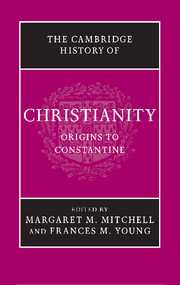Book contents
- Frontmatter
- Prelude: Jesus Christ, foundation of Christianity
- Part I The Political, Social and Religious Setting
- Part II The Jesus Movements
- Part III Community Traditions and Self-Definition
- Part IV Regional Varieties of Christianity in the First Three Centuries
- Part V The Shaping of Christian Theology
- Part VI ‘Aliens’ become Citizens: towards Imperial Patronage
- Conclusion: retrospect and prospect
- Bibliographies
- Index
- Map 1. The Roman Empire in the time of Marcus Aurelius
- References
Conclusion: retrospect and prospect
Published online by Cambridge University Press: 28 March 2008
- Frontmatter
- Prelude: Jesus Christ, foundation of Christianity
- Part I The Political, Social and Religious Setting
- Part II The Jesus Movements
- Part III Community Traditions and Self-Definition
- Part IV Regional Varieties of Christianity in the First Three Centuries
- Part V The Shaping of Christian Theology
- Part VI ‘Aliens’ become Citizens: towards Imperial Patronage
- Conclusion: retrospect and prospect
- Bibliographies
- Index
- Map 1. The Roman Empire in the time of Marcus Aurelius
- References
Summary
While Eusebius of Caesarea could account for subsequent events by issuing new editions with updated endings to his Historia ecclesiastica, we must bring this first volume to a definitive close. Like Eusebius, we take Constantine as our line in the sand, but, with the gift of historical perspective, we know that there is a long and convoluted story of Christianity reaching beyond him. We can happily leave it to the next eight volumes to sketch and analyse that once unimaginable history – in Europe, Latin America, Africa, China, in the medieval west, the Byzantine east, in Renaissance and reformation, modernity and even post-modernity – that is yet to come. But where does this volume leave us in the project of rendering an adequate historiographic account of the Christian religion? Is it possible to trace in the acorn the lineaments of the oak tree, with its main trunk and many branches? In telling their history, Christian churches through the ages have either claimed organic continuity with ‘Christian origins’ or sought a radical return to origins they feel have been betrayed. Yet all along, both creativity and a process of adaptation to varieties of cultural experience have vied with conservative instincts, such that one might well ask: can ancient Christianity really be regarded as the true foundation for subsequent history?
To the extent that, by the end of our period, a roughly coherent shape has emerged from a rather amorphous range of initial possibilities, it is perhaps possible to respond in the affirmative. The essays in this volume have documented how, in various locations over the first three centuries, Christians set in place the structures and forms of discourse that transformed the early missionary groups into a religious movement that spread throughout the Mediterranean basin and beyond it, one capable of transmission from one generation to the next. They developed texts, rituals, lifestyles, institutions, laws, forms of education and socialisation, and various modes of historical self-understanding which were to mark the movement from there forward.
- Type
- Chapter
- Information
- The Cambridge History of Christianity , pp. 586 - 589Publisher: Cambridge University PressPrint publication year: 2006



